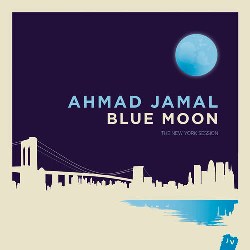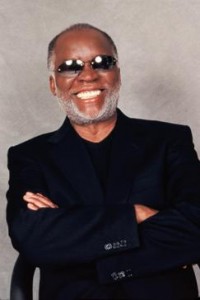(PITTSFIELD, Mass.) – Jazz legend Ahmad Jamal, who calls Sheffield, Mass., home, will be celebrating the release of his newest CD, Blue Moon, in concert at the Colonial Theatre on Saturday, March 31, 2012, at 8pm.
Comprised of brilliant new interpretations of songs from two of America’s most storied mediums of entertainment – classic films and Broadway – and originals that convey pure majesty, each of the nine pieces on the hard-swinging Blue Moon recording showcases Jamal’s creative reinvention as well as his orchestral approach to the piano keyboard.
For the album, Jamal surrounded himself with an all-star rhythm section comprised of bassist Reginald Veal, drummer Herlin Riley and percussionist Manolo Badrena. Veal, whom has made a name and a sound for himself with the likes of Wynton Marsalis and Joshua Redman, is a younger musician, yet provides the group with a rock solid foundation. On one side of the group sits Riley, whom after spending years of work on the New York scene recently came back to work with the pianist who got him started in the mid-1980s. On the other side sits Jamal’s old friend Badrena, a percussionist who was part of Wayne Shorter and Joe Zawinul’s Weather Report in the mid-to-late 1970s.
Noted for his outstanding technical command and identifiable sound as a piano stylist, Jamal considers his ensemble “an orchestra.” Jamal not only achieves a unified sound, but subtly inserts independent roles for the bass and drums.
The hallmarks of Jamal’s style are rhythmic innovations, colorful harmonic perceptions, especially left hand harmonic and melodic figures, plus parallel and contrary motion lines in and out of chordal substitutions and alterations and pedal-point ostinato interludes in tasteful dynamics.
Jamal also incorporates a unique sense of space in his music, and his musical concepts are exciting without being loud in volume. Augmented by a selection of unusual standards and his own compositions, Jamal notably impressed and influenced, among others, trumpeter Miles Davis.
In 1994, Jamal received the American Jazz Masters fellowship award from the National Endowment for the Arts. That same year he was named a Duke Ellington Fellow at Yale University, where he performed commissioned works with the Assai String Quartet. In 2007 the French Government inducted Jamal into the prestigious Order of the Arts and Letters by French Culture Minister Renaud Donnedieu de Vabres, naming him Officier de l’Ordre des Arts et des Lettres. In December 2011, Jamal was awarded with DownBeat’s 76th Reader’s Poll Hall of Fame.
Jamal’s previous recording, A Quiet Time (Dreyfus Records), released in January 2010, was the number one CD on jazz radio for the year 2010 and continues to soar. The French Jazz Academy has voted The Complete Ahmad Jamal Trio Argo Sessions 1956-1962, released by Mosaïc, as the “Best reissue of the year with outstanding research work.”
 The title track of Blue Moon, a song popularized by the likes of Billie Holliday, Mel Torme and even Elvis Presley, was actually written in 1934 for the MGM film Hollywood Party. Jamal knows its very depths. “I used to play it a lot when I was a child, in private,” he says. In Jamal’s hands, the tune only vaguely resembles the “Blue Moon” of your memory; his arrangement is a percussion-heavy, hard-swinging, riff-based excursion that speaks as clearly to a generation raised on hip-hop to the pre-rock, “Great American Songbook” listeners.
The title track of Blue Moon, a song popularized by the likes of Billie Holliday, Mel Torme and even Elvis Presley, was actually written in 1934 for the MGM film Hollywood Party. Jamal knows its very depths. “I used to play it a lot when I was a child, in private,” he says. In Jamal’s hands, the tune only vaguely resembles the “Blue Moon” of your memory; his arrangement is a percussion-heavy, hard-swinging, riff-based excursion that speaks as clearly to a generation raised on hip-hop to the pre-rock, “Great American Songbook” listeners.
“Blue Moon” is not the only composition drawing from the world of film. Jamal revisits “Invitation,” a song from the original soundtrack of A Life of Her Own, the 1950 George Cukor movie. Jamal’s interpretation of the composition gives the adopted jazz standard new meaning, featuring an infectious groove underneath Jamal’s distinctive approach to the melody. In the same vein, though in solo format, Jamal reinterprets “Laura,” the Johnny Mercer classic that gave its title to the 1944 Otto Preminger masterpiece (a song that he considers to be “one of my favorites”).
Just as other jazz musicians have often transfigured popular Broadway shows over the years, Jamal showcases his version of “This Is The Life,” excerpted from Golden Boy, a 1964 success that featured Sammy Davis Jr. Without erasing its original melodic energy, Jamal draws original obliques with the strength of his personal, sensual approach to the keyboard.
Such a ubiquitous gift allows the pianist to prove in turn allusive and even more expressive on “The Gypsy,” another borrowing from the popular songbook repertoire, and which has become a standard since Charlie Parker recorded the composition 1946.
Jamal added three compositions of his own: “Autumn Rain,” already recorded, but presented on Blue Moon in completely different form, “Morning Mist,” and “I Remember Italy,” which underlines the empathy he has for that country. On the last, Jamal draws a musical novel, full of bright colors reminiscent of the most important painters (a track that channels the impressionistic classical music period of Claude Debussy and Maurice Ravel). “I am often influenced by the cities I travel through, to which have been many. But Italy really has a peculiar flavor. Traveling is good for me, even if my favorite city is home.”
An important and influential figure in jazz history (he was a key influence on Miles Davis in his formative years, and countless others), Jamal introduced the concepts of space, silence and dramatic dynamics into jazz performance. He continues to influence a diverse generation of artists from Herbie Hancock, Hiromi to Matthew Shipp. Renowned critic Stanley Crouch considers Jamal’s distinctive style as having an influence on the same level as “Jelly Roll Morton, Fletcher Henderson, Duke Ellington, Art Tatum, Count Basie, Thelonious Monk, Horace Silver and John Lewis, all thinkers whose wrestling with form and content influenced the shape and texture of the music, and whose ensembles were models of their music visions.”
In reflecting on the overall album and group’s chemistry, Jamal states, “Recording an album is like playing on stage. All together and most importantly not isolated in our booths. There is no secret: it is a very human matter.” This organic interaction is clear on the album.
Tickets to Ahmad Jamal are $15–$50. Tickets may be purchased in person at the Colonial Theatre Ticket Office at 111 South Street or by calling 413. 997.4444 or online at the Colonial Theatre. The Ticket Office is open Monday-Friday 10am–5pm, Saturdays 10am–2pm or on any performance day from 10am until intermission.

